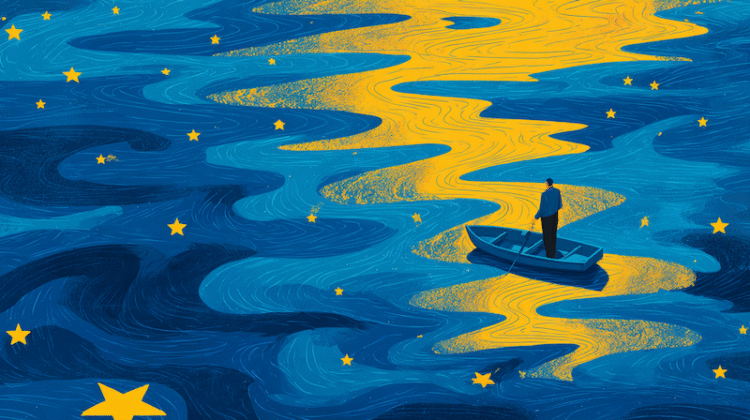Amid a world of resurgent imperial powers, a fragmented Europe grapples with its past and uncertain future.

“I’m standing here in pieces, and you’re having delusions of grandeur!” The line, delivered in an acclaimed Hollywood movie from 1980, might well serve as Europe’s most accurate opening gambit in a conversation with Donald Trump’s America. The futuristic setting of “Star Wars: The Empire Strikes Back” could also bring to mind China’s “galaxy empire,” recently depicted by John Keane and Baogang He in their compelling book of the same title. And the Empire’s relentless pursuit of the rebels in that epic film might evoke President Putin’s brutal assault on neighbouring Ukraine. Indeed, the empire—or, perhaps more accurately, the empires—are back, and Europe, seemingly standing in pieces, appears unable to consolidate its strength to confront this new global reality. It did not have to unfold this way, and there may yet be time to reverse Europe’s diminishing fortunes.
A few decades ago, Europe seemed poised to become an empire of sorts itself. After the Soviet Union’s collapse, the European Union embarked on a policy of territorial enlargement that bore some resemblance to a benign imperial project. The E.U. expanded its reach not by force of arms, but through financial assistance and the export of its legal framework. States in Central and Eastern Europe and the Balkans were gradually integrated into the E.U.’s shared space, but under stringent conditions; democracy, the rule of law, and free trade were paramount among them. Their scope for diplomatic negotiation remained largely theoretical, owing partly to the significant wealth disparity between the E.U. and the candidate states, and partly to the absence of any genuinely appealing alternatives.
The widening of the E.U. coincided with the deepening of its integration project. The Union established a single market and currency, shared external (Schengen) borders, and a common foreign and security policy. When the conflicts in the Balkans starkly exposed the E.U.’s military limitations, the Union resolved to create a defence capability of its own. This culminated in the decision at the 1999 Helsinki summit to develop an autonomous capacity to deploy sixty thousand troops within sixty days for operations lasting up to a year. At the turn of the twenty-first century, the E.U. began drafting its own constitution, an effort intended to consolidate and strengthen the European legal, economic, and institutional architecture. Yet the promised military capability never fully materialized, and the proposed European Constitution was subsequently rejected by voters in referendums held in two of the integration project’s founding members, the Netherlands and France.
The failure of the European Constitution in 2005 marked the advent of a new phase in European politics: the sovereigntist era. From that point on, the Eurosceptic right began to achieve significant electoral successes across the continent, campaigning against an allegedly over-powerful European Union that they claimed was undermining democratic states. Brexit, the most striking manifestation of this trend, was framed explicitly as an effort to reclaim sovereignty for Westminster from European bureaucrats in Brussels. While the substantial costs of Brexit prompted continental Eurosceptics to adjust their strategy, the underlying aspiration to restore nation-states as the ultimate arbiters of power did not wane. The objective shifted to weakening Brussels’s influence from within the E.U., primarily by vetoing common initiatives and undermining European institutions. The vision was a Europe composed of proud and sovereign nations, finally laying to rest the spectres of a federal Europe. According to this view, unelected European commissioners and judges should not presume to question the sovereign will of the people, as expressed through national elections that brought sovereigntist parties to power.
The ascendancy of populists led many liberal politicians to become timid, often adopting a milder version of the sovereigntist rhetoric themselves. How further integration could possibly proceed with twenty-seven member states zealously defending their narrow national interests was never adequately explained. Nor was it clear how the E.U. could genuinely assert its influence on the global stage with its common institutions effectively paralysed. Then, in 2022, President Putin launched his invasion of Ukraine in a manner that felt purely imperial, seemingly aided by China’s burgeoning power. As if that were not enough, President Trump has also embarked upon what the author sees as an imperial undertaking, characterized by demanding new territories, bullying long-standing allies, and disregarding international commitments and norms. This confluence of events delivered a profound shock to Europe’s public and political class, prompting a belated recognition that the old continent now resembles a fragmented mosaic of relatively small and poorly armed states, seemingly incapable of unified action when confronted by the resurgence of imperial politics.
Empires, by their very nature, impose constraints—legal, economic, and political—on actors who may be formally sovereign. Consider, for example, the endorsement of Alice Weidel, the leader of Germany’s far-right party, by the U.S. Vice-President ahead of German parliamentary elections. One need not even mention President Putin’s demands that Ukraine’s army be disarmed and its democratically elected president be deposed. Sovereignty, in an era of empires, is at best a relative concept, if not an outright illusion, particularly for weaker players. A European entity, even an imperfect one, would undoubtedly be better equipped to navigate this historic imperial turn than a disparate collection of small, self-interested, fractious, and seemingly lethargic European nations.
It would be misguided to assume that the only effective response to the imperial resurgence is the creation of a highly centralized, autocratic, and heavily armed European super-state. History demonstrates that imperial power politics have manifested in various forms, adapted to specific circumstances and the unique characteristics of the empires themselves. To succeed, empires often needed to be smart, not merely muscular. Territory and influence were frequently augmented more effectively through strategic alliances and marriages than through warfare. An empire’s normative appeal, its so-called “civilizing mission,” was often a more successful tool for stabilizing peripheries than the application of brute force. While centralized governance facilitated the ability to “bribe” and punish reluctant states, conduct covert negotiations, and manipulate international institutions, polycentric governance proved effective in fostering a structural environment conducive to peace and cooperation.
The actions of Presidents Trump, Xi, and Putin seem to have prompted Europe to recognize the urgent need to enhance its military capabilities. However, for the foreseeable future, the E.U.’s most potent power will likely remain its economic and normative strength. The former stands a reasonable chance of withstanding the challenges posed by imperial America and China, provided the E.U. follows recommendations such as those outlined by Mario Draghi, aimed at boosting the Union’s innovation, productivity, and competitiveness. The E.U.’s normative power, meanwhile, has been eroded recently by the rise of xenophobic, inward-looking, and self-serving political movements. The original intention behind the E.U.’s 2003 Neighbourhood Policy was to cultivate “a ring of friends,” establishing pan-European “zones of prosperity” that would lead to an “undivided,” “wider” Europe. Achieving these highly desirable objectives necessitates reactivating the process of E.U. enlargement, fundamentally rethinking migration policies, and revitalizing economic investment in neighbouring regions.
This is, admittedly, more easily said than done in the current political climate, but Europe’s citizens must confront the reality that their prosperity and security cannot be taken for granted when wars, poverty, and autocracy persist just across their borders. Ukraine serves as the most immediate test case for Europe’s resolve, but the Middle East, North Africa, and the Balkans cannot be ignored.
Europe’s military weakness must be addressed, but not necessarily by simply purchasing more American weaponry. The focus should instead be on integrating European military structures and building a robust industrial base capable of meeting the demands of modern warfare. Given that the E.U. is significantly weakened without the military capabilities of the United Kingdom and hampered by Hungary’s veto power, exploring novel regional solutions becomes imperative. This underscores the value of endorsing informal coalitions of the willing, such as the one initiated by the U.K. and France, which could, in time, evolve into a genuine European defence pillar, whether operating within or independently of NATO.
Europe should neither pretend to be nor aspire to be an empire akin to contemporary Russia, China, or even America. The E.U.’s greatest asset has always been its capacity to lead by example, a strength demonstrated through the successes derived from its policy of open borders for goods, services, capital, and labour. Europe was once an object of global admiration when it created a democratic sphere governed by the rule of law and the protection of human rights. Its steadfast commitment to multilateral cooperation and a rules-based international order also garnered applause in various parts of the world.
This is not to sound like a nostalgic liberal advocating for policies of a bygone era. Liberals have, at times, regrettably abandoned their noble principles, generating the public frustration that populists have so effectively exploited. However, ultimately, the global struggle is fundamentally about articulating and implementing a superior model for peace, justice, and welfare for all inhabitants of this planet. It would be profoundly foolish for Europe to abandon its greatest strengths—openness, cooperation, the rule of law—in favour of policies based on erecting walls and engaging in bullying, tactics that have historically proven to be Europe’s most significant failings.
This is a joint column with IPS Journal
Jan Zielonka is professor of politics and international relations at the University of Venice, Cá Foscari, and at the University of Oxford. His latest book is The Lost Future and How to Reclaim It (Yale University Press, 2023).
